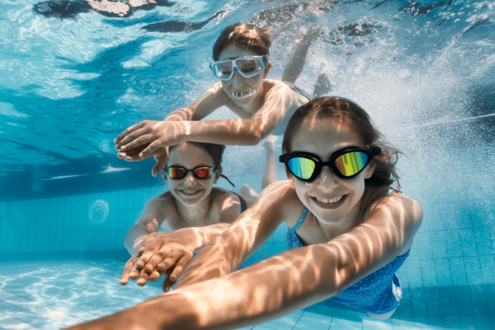
There’s no discounting how a day at the beach, a waterpark, a pool, a lake, or a river, can help you put your worries aside. But, one thing that you should never lose sight of is the fact that wherever there’s water, there’s a risk of accidental drowning.
According to the National Drowning Prevention Alliance, over 4,500 Americans die every year from unintentional drowning, with children ages 1-4 at greatest risk. But even good swimmers can drown.
Drowning can happen in as little as 20-60 seconds, with victims often unable to call for help.
While the risk of drowning can’t be eliminated completely while on the water, the risk can be substantially reduced by following these evidence-based water safety tips and strategies.
Little ones and water: A dangerous combination
- Drowning is the leading cause of death among children ages 1 to 4 and the second leading cause of death for those aged 5 to 14.
- An estimated 1,000 children fatally drown each year in the U.S., most of them between May and August.
- Nearly 70% of toddler drownings occur during non-swim time, when a child is near water but not actively swimming, such as during a family outing or while playing in a shallow area.
- Most child victims had been out of sight for less than 5 minutes.
- 88% of child drownings occur with at least 1 adult present.
- Half of the child drowning victims are within 25 yards of a parent or other adult.
- Most child drowning deaths occur in swimming pools located at a private residence (75%).
- Children with autism are 160 times more likely to drown when compared to neurotypical children.
Learn to Swim
Swimming is more than just a recreational activity—it’s a crucial life skill that can save a life. The American Academy of Pediatrics recommends starting swimming lessons as early as one year old. But anyone can learn at any age.
To find swimming lessons near you, visit one of the following sites:
You can also contact local your local pool to learn when they’re hosting lessons:
MASSACHUSETTS
Williamstown
NEW YORK
Hoosick Falls
VERMONT
Bennington
Bennington Rec - Berkshire Family YMCA
Manchester
Stay Alert
- Always keep a close eye on children when they are in or near water. Designate a responsible adult to watch over them and avoid distractions like reading or using a phone.
No one should swim alone, regardless of age or skill. Swimming with a buddy ensures help is available in an emergency.
Ensure that everyone, especially non-swimmers and children, wears a properly fitted life jacket when boating or participating in water sports.
Swim in areas supervised by lifeguards whenever possible. These areas are usually safer and have help readily available in case of an emergency.
Practice Pool Prevention
- If you have a pool at home, install a fence with a self-closing, self-latching gate to prevent unsupervised access by children.
- Consider taking a CPR course to be prepared.
- Remove toys and floats from the pool area when not in use to prevent children from being tempted to enter the water unsupervised.
- When the pool is not in use, cover it with a safety cover to prevent accidental falls.
Be Beach Savvy
- Always swim in areas where lifeguards are present. They are trained to respond quickly in emergencies.
- Always check the weather and water conditions. Avoid swimming in rough seas or during storms.
- Learn how to identify and escape rip currents. If caught in one, swim parallel to the shore until you are out of the current, then swim back to shore.
Boating Safety
- Be sure everyone on board always wears a life jacket.
- Familiarize yourself with and follow local boating laws and regulations.
- Before heading out, check that your boat is in good working condition and that you have all necessary safety equipment, including flares, a first aid kit, a fire extinguisher, and a life jacket for everyone on board.
- Do not overload the boat with people or equipment, as this can make it unstable and increase the risk of capsizing.
Water activities are a welcome summer highlight, but they come with real risks. By following proven safety practices, you can enjoy the water while minimizing the danger of a preventable drowning tragedy.
Spencer Ciancola, PA, is a member of the ExpressCare team at Southwestern Vermont Medical Center.